‘It’s been pretty wild, though it’s probably been wild everywhere.’
Across the country, spring breaks are getting extended, classes are getting canceled and moved online and students are left stranded with more questions than answers in the face of the rapid spread of COVID-19.
14 East reached out to students at various universities across the country to see how they were responding to the threat of the disease on campus — and how those responses compared to DePaul.
‘It’s such a big thing, but for the majority of people, it still seems distant.’
For senior Maya Fenter at Miami University in Oxford, Ohio, the fallout from the spread of COVID-19 has felt chaotic.
“To answer your question about how it’s gone down at Miami, it’s been pretty wild, though it’s probably been wild everywhere,” Fenter said.
Students haven’t seemed to be taking it too seriously, however, and instead have been using it as a get-out-of-class-free card.
“People don’t seem worried enough to stay in their dorms or apartments for sure and are just taking advantage of the fact that we don’t have to show up to class,” Fenter said.
“My classmates and I were talking about the potential for the administration telling us not to come back after break, and we were all generally more concerned about not getting to finish our senior year than the idea of getting infected,” she said.
“So, yeah, it’s just been weird overall, like it’s such a big thing, but for the majority of people, it still seems distant.”
Seniors especially have been feeling the effects of having to close spring term early.
“As a second-semester senior, I’m frustrated with the entire situation, just because these are my last few months of college and I’m being told not to come back to campus for the next couple of weeks,” said Catie Harper, a senior at James Madison University in Harrisonburg, Virginia.
At Andrews University in Berrien Springs, Michigan, students were outraged by the university’s decision to cancel graduation.
“Seniors aren’t going to walk for graduation, so I’ve heard some anger at that,” said Andrews University senior Nicholas Navarro. “Mostly, everyone seems in shock at how sudden it is.”
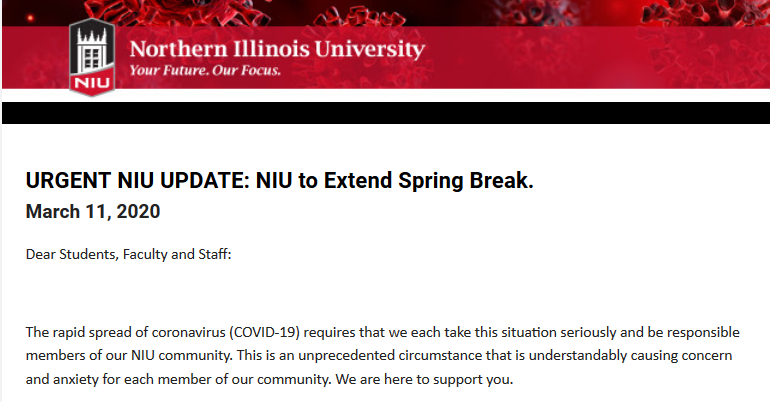
Northern Illinois University students found themselves with an extended Spring Break following an email sent by President Lisa Freeman on March 11. Email courtesy of Mare Yarger.
Nursing student Mare Yarger, a senior in her program at Northern Illinois University (NIU), is especially feeling the strain considering that nursing students are required to complete practical rotations at hospitals, also known as clinicals.
“If clinicals turn us away, basically their plan is that they’re going to find a hospital that will take students and [make a rotation so] that each student gets at least a day and do everything else in a simulation lab,” Mare said.
In a later update, NIU said that all nursing students will need to be screened by the university for COVID-19 before participating in any clinicals for the rest of the year.
For Mare’s sister Elaine Yarger, who is a senior at Carroll University in Waukesha, Wisconsin, the biggest concern is about classes moving online.
“We didn’t think Carroll was going to cancel, then they pushed our spring break for a week,” Elaine said. “We’re resuming classes, but they haven’t said anything about us going online.”
Overall, the energy at Carroll has been light; Carroll University’s Barstool page, like many across the country, has been posting jokes and memes about COVID-19.
“The vibe was mainly, like, no one really cared about it except now,” Elaine said. “Carroll has their Barstool page and they were posting memes about Carroll not closing while the [University of Wisconsin] schools were closing.”

UW Madison Chancellor Rebecca Blank sent an email to students on March 11 informing them about policy changes—that the university would switch to online instruction and residence halls would partially close. Email courtesy of Drew Quiriconi.
Even up until University of Wisconsin, Madison (UW Madison) announced that they were closing, students on campus were sharply divided between those who were concerned about COVID-19 and those who weren’t, according to senior Drew Quiriconi.
“There was a group of people who were carrying their Purell and constantly using it, and there was another group of people who were saying that they don’t care,” Quiriconi said. “After they announced that they were actually canceling classes, that pushed everyone to take it a little more seriously.”
On the West Coast, students seem to be a bit more worried. California State University, Fresno (Fresno State) junior Meghyn Torabi has been cautiously waiting for updates, especially as a high school color guard instructor.
“They’re thinking about [closing],” Torabi said. “There’s only one case in the city. There are a couple in my hometown and neighboring counties, so our color guard circuit might cancel championships.”
Students and faculty at Fresno State have definitely been paying attention to updates about COVID-19, according to Torabi.
“I know my friend that I commute with is worried and we talk about the updates often,” Torabi said. “I hear professors worried and I hear students talking about it in passing in the halls.”
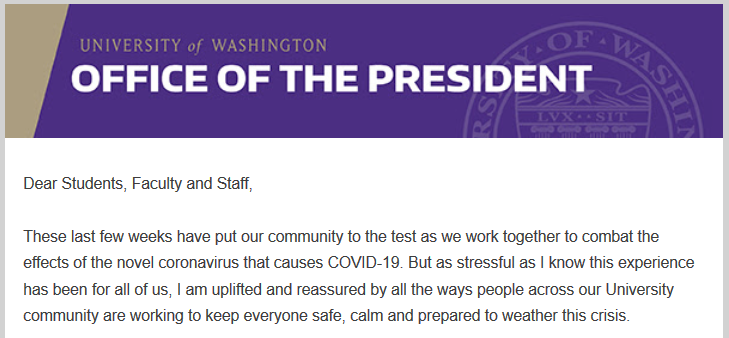
An email from President Ana Mari Cauce to students at the University of Washington sent on March 11 promises more concrete decisions by March 20. Email courtesy of Thomas Star.
A little further north in Seattle, University of Washington (UW) junior Thomas Star has noticed the shift on campus, especially now that classes are canceled.
“I haven’t been on campus for about a week but I remember last Thursday and Friday it felt kind of empty, almost how you’d expect it to look during summer quarter, you know?” Star said.
“There were a few people walking around with masks on but I think the people who were actually panicking had already gone home.”
‘They definitely kept the students abreast of what’s happening, but it feels like they’re kind of covering their asses.’
Students from various schools have felt informed, abandoned and confused about their university’s responses to COVID-19.
Quiriconi said UW Madison did a fairly good job of keeping students informed, but it felt like they were just following other schools, rather than taking strong action on their own.
“The one thing with UW Madison is that when it comes to situations like this, they’re not leaders in terms of actions, they’re generally much more hesitant to cancel classes,” Quiriconi said.
“I kind of compare this to the situation last year when there were subzero temperatures, and they waited until the last moment to cancel classes for a single day after other Wisconsin schools had canceled. They definitely kept the students abreast of what’s happening, but it feels like they’re kind of covering their asses.”
At Andrews University, Navarro felt blindsided by the decision to close down. He said the first communication the university had sent to the students about COVID-19 was the notification that they had to move out.
“I mean, they are refunding some dorm fees, but no, it was all very sudden,” Navarro said. “I haven’t heard of any moves from the university to help out. I’m still not even really sure how online classes are going to work, or even where I am going to turn in assignments.”

An email to University of Pittsburgh students on March 11 outlines COVID-19 policies, including canceling study abroad programs, switching to online classes and asking students to not return to on-campus housing. Email courtesy of Emily Mensing.
For sophomore Emily Mensing, this short notice is even more alarming; she’s not sure where she’s going to go if she can no longer live on-campus at University of Pittsburgh.
“Everyone’s in shock, because they’re moving people out starting this morning,” Mensing said. “They wanted me to move out between 12-4 pm [on March 13] but I can’t.”
Some students feel like this is a neglect of their safety. Junior Wyatt Webb at California Polytechnic State University, San Luis Obispo (Cal Poly) says that he feels like the school has been prioritizing their schedule rather than student health.
“Update emails are sent daily and seem to be turning a blind eye to a serious issue just so we can finish out the quarter,” Webb said. “Our school is not taking into any consideration students’ health insurance or risk of contracting or spreading the virus. It’s honestly pretty upsetting.”
At University of Wisconsin, Whitewater (UW Whitewater), junior Katie Daujotas is concerned about how students with disabilities will cope with the lack of direction, based on initial lack of response from the university.
“Everyone just wants the university to make an actual decision, we’re kinda suspended in the unknown right now and all the universities around us have a plan and we don’t. We know something is gonna happen, we just don’t know what or when,” Daujotas said.
“Professors don’t know whether to prepare to go online. We also have a large disabled community here, which, [UW] Whitewater brags about being inclusive, but that community is very vulnerable right now because they could have complications that make them immunocompromised,” she continued.
Since 14 East spoke to UW Whitewater students, the university has extended its spring break by an additional week and transitioned into three weeks of online classes.
Depending on their different majors, students take issue with different things. According to University of Illinois, Chicago (UIC) junior Nadeen Elsayed, students feel like their needs aren’t being met.
“A lot of our STEM majors are frustrated because they still need to come to campus for their labs, lots of student [organizations] are upset from all the canceled events, and just a lot of frustration overall because the U of I system just seemed super unclear in that email so professors are doing whatever the heck they want and we can’t do much about it,” Elsayed said.
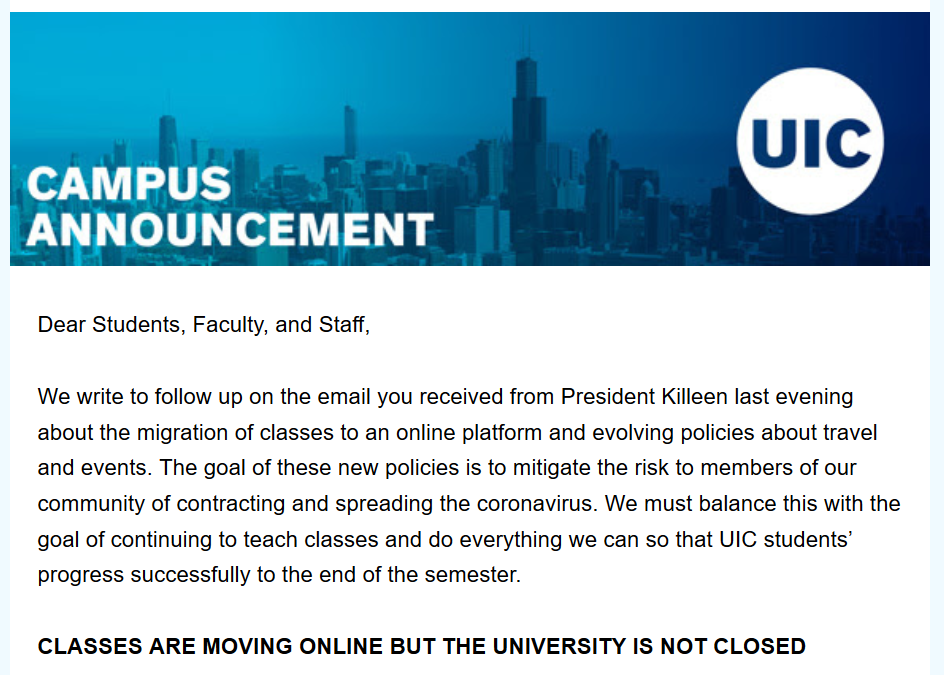
University of Illinois at Chicago students received additional instruction following a state-wide email from University of Illinois System president Timothy Killeen. Email courtesy of Nadeen Elsayed.
Even though he wishes there was more information from the administration, Cornell University junior Nnaemeka Nwankpa thinks they are doing the best they can.
“Overall, we have been recognizing that the best efforts and precautions are being taken by the university to accommodate us, but we still are searching for final resolutions,” Nwankpa said.
Many students, despite their frustration, also understand that universities are faced with a tough situation; with how rapidly COVID-19 is spreading, universities are scrambling to figure out how to respond to the situation.
DePaul formed a task force of faculty and administrators meant to formulate the official university response to the unfolding information about COVID-19, mirroring the response at many other universities, such as Rochester Institute of Technology in upstate New York and Northeastern University in Boston. The University of Illinois system has created a “leadership team,” and other other schools have created COVID-19 hotlines, like Northwestern University and UW Whitewater.
However, just because a task force has been formed doesn’t mean that all these issues are solved. At DePaul, students have been voicing their displeasure at the way the university initially handled the situation.
“When you’re talking about, like, forcing so many people to move out you need to give detail by detail information rather than just being like, freshmen who live in the resident hall, expect not to return,” said Carlie Jacobsen, a DePaul freshman from Atlanta. “It’s really unfair to out of state students because they’re not giving us other options.”
[formidable id=”1″ minimize=”1″ size=”200px”]
‘Bars are having weekend specials on weekdays now’
Now that campuses are closing and moving classes online, students are left with one last decision: what to do with all this time.
At Miami University, for some students, this means drinking.
“I saw a video circling around of one of the liquor stores just an hour after the email came out saying that classes were going to be moved online, and the line was wrapped all the way around the store,” Fenter said. “I was at trivia tonight and it was the most crowded I’ve ever seen it. Bars are having weekend specials on weekdays now.”
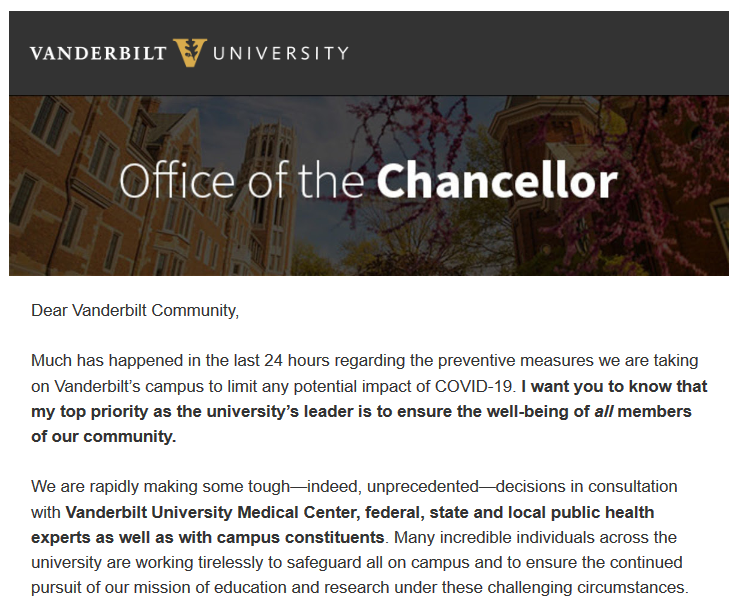
Vanderbilt students received an email from Interim Chancellor and Provost Susan Wente on Tuesday, March 10. Email courtesy of Ella Leitman Dixon.
Vanderbilt University student Ella Leitman Dixon said that the university seemed to have collectively decided to party. Students at Vanderbilt have been told to move out from residence halls by Sunday, though many are leaving by Friday—and not all students are bringing everything with them.
“Almost everyone who I know either threw or attempted a party where the theme was ‘bring all the alcohol and drugs that you can’t bring home to your parents given that some of you are getting on flights at like 7 a.m.,’” Leitman Dixon said.
“Everybody has been screaming and, like, everyone has been hanging out with their friends because it’s the last day of their senior year.”
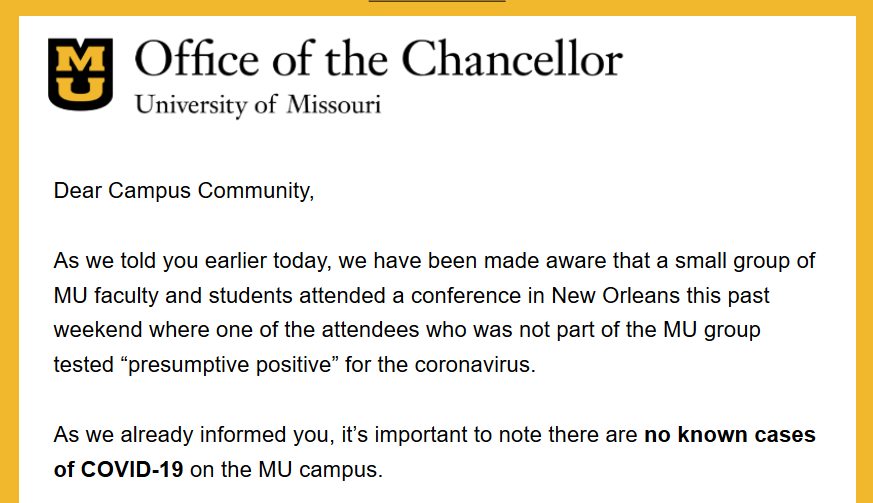
Students at Mizzou received an email about COVID-19 from Chancellor Alexander N. Cartwright on Wednesday, March 11. Email courtesy of Natalie Nepper.
University of Missouri (Mizzou) senior Natalie Nepper said that students there have been taking advantage of the days off class.
“The bars downtown were packed with students and everyone went to parties,” Nepper said. “There wasn’t an atmosphere of confusion or anger that you see at other universities because they didn’t close campus, evict people from their dorms, or shut down the dining halls at all. So we were all basically operating as if it were a snow day.”
However, the Mizzou administration has been recommending healthy coping strategies.
“The vice provost’s office also suggested using the app Sanvello to manage stress and anxiety about coronavirus at the end of his email, which was an interesting touch,” Nepper said.
And at James Madison University, students are finding other ways to get the most out of their online classes.
“My professor for my sports communication class, which is based heavily on in-class discussion, is encouraging us to engage with him on Twitter about how the virus is impacting sports,” Harper said. “I thought that was a pretty interesting and different way to keep the class engaged with each other.”
As the story of COVID-19’s sprawling growth across the country unfolds, students will have to wait, see and learn how to thrive in the ambiguity.
How we wrote this story:
With DePaul’s announcement of its COVID-19 policies released only 24 hours prior to publishing, we used social media—Snapchat, Instagram and Twitter—to reach out to students from various higher education institutions across the United States.
Students we contacted were from the following colleges and universities:
American University; Andrews University; California Polytechnic State University, San Luis Obispo; California State University, Fresno; Carroll University; Clemson University; Cornell University; Eastern Michigan University; Harvard University; Illinois State University; Indiana University, Bloomington; James Madison University; John Jay College of Criminal Justice, City University of New York; Loyola University; Miami University, Ohio; Northeastern University; Northern Illinois University; Penn State University; Purchase College, State University of New York; Purdue University; Rochester Institute of Technology; School of the Art Institute of Chicago; Smith College; St. Louis University; St. Mary’s College; Syracuse University; Temple University; University of California, Berkeley; University of Illinois, Chicago; University of Illinois, Urbana-Champaign; University of Missouri; University of Notre Dame; University of Pittsburgh; University of Washington; University of Wisconsin, Madison; University of Wisconsin, Whitewater; West Virginia University and Vanderbilt University.
Students forwarded official email messages from their colleges or universities to an email account we created to make sifting through policies easier. From there, we collected quotes from students on the policies announced by their administration, the general atmosphere of the university, and students’ personal experiences.
We based this story entirely on the experiences of students at these colleges and universities; we did not contact staff, faculty or administrators from any of the named institutions.
Related 14 East stories:
What You Need to Know About COVID-19
DePaul & COVID-19: What We Know So Far
DePaul Final Exams to Move Online, Spring Quarter to be Remote in Response to COVID-19
DePaul’s On-Campus Housing: What Residents Need to Know




DePaul Final Exams to Move Online, Spring Quarter to be Remote in Response to COVID-19 – Fourteen East
13 March
[…] Wednesday evening DePaul University joined the growing number of colleges and universities across the country moving courses online in response to the spread of COVID-19, […]
DePaul & COVID-19: What We Know So Far – Fourteen East
13 March
[…] College Students Across the Country Cope with Academic Changes as COVID-19 Spreads […]
DePaul’s On-Campus Housing: What Residents Need to Know – Fourteen East
13 March
[…] College Students Across the Country Cope with Academic Changes as COVID-19 Spreads […]
What You Need to Know About COVID-19 – Fourteen East
13 March
[…] College Students Across the Country Cope with Academic Changes as COVID-19 Spreads […]
Tracking Two Turbulent Weeks of DePaul COVID-19 Announcements – Fourteen East
20 March
[…] like many universities across the country, quickly adapted broad policies requiring students to move out of residence halls and classes to […]